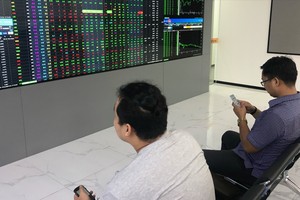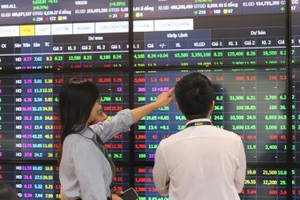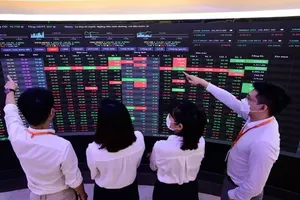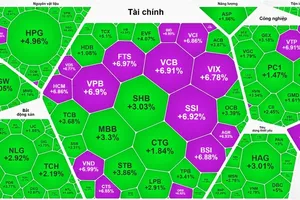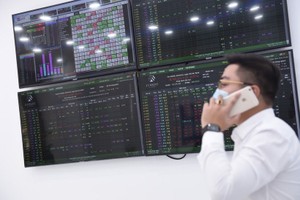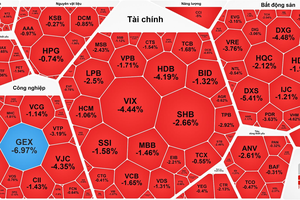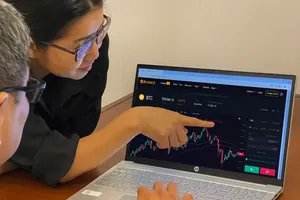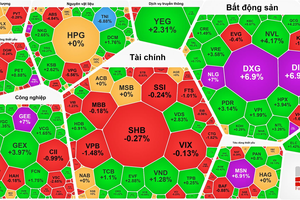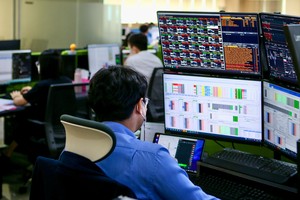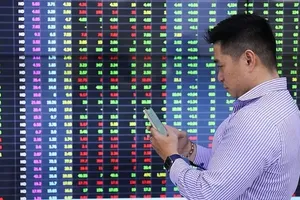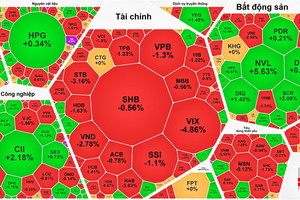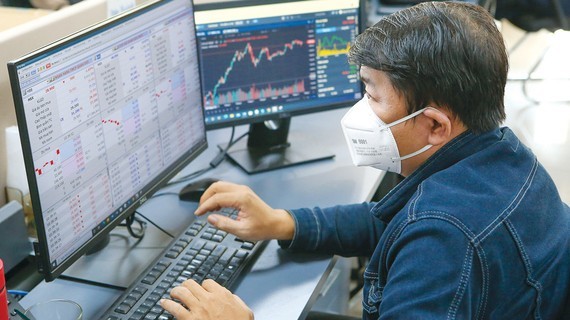 The current stock market context can be an opportunity for investors. (Photo: SGGP)
The current stock market context can be an opportunity for investors. (Photo: SGGP)
Investors keep losing
In September 2022, the VN-Index lost 11.5 percent to 1,132.11 points. Only in September, the market capitalization evaporated about VND610 trillion (equivalent to US$25.4 billion). Vietnam's stock market fell into the group of stock markets with the strongest decline in the world.
After experiencing Black September, many investors believed that the market had hit the bottom, so they jumped in for bottom-fishing. However, the market in the first two weeks of October continued to wobble and dropped deeply. The VN-Index sometimes fell off from the 1,000-point mark, and all stocks that had fallen sharply before continued to plunge. So far, the VN-Index has lost 500 points from the peak set in April 2022. Notably, the VN-Index plummeted by about 35 percent, but the basic stocks also discounted 40-60 percent from the peak. Many stocks even have devalued up to 70 percent, like GEX, and real estate stock with the highest market value - L14 - has sunk 90 percent from the peak.
Hoai An, living in District 3, HCMC, a long-time investor in the stock market, said he was holding some good basic stocks, such as banking and insurance. However, in the first nine months of 2022, his total account suffered a loss of more than 40 percent. With no cash left, he used margin for bottom-catching in the last trading session of September. Unfortunately, the market unexpectedly continued to plummet, so bottom-fishing became a disaster, causing him to suffer more losses of nearly 20 percent. Not only An but many investors, who have held bank stocks from the beginning of 2022 to now, have also suffered heavy losses because this group of king stocks has decreased by more than 50 percent although the business results of banks are thriving.
Not only individual investors but even large investment funds, like VEIL, a billion-dollar investment fund under Dragon Capital, also lost nearly 15 percent, equivalent to roughly $315 million (more than VND7.6 trillion) in September 2022. Similarly, the investment fund from Finland PYN Elite also recorded a decrease of more than 13 percent (equivalent to a decrease of nearly 60 million euros, or nearly VND1.39 trillion) in investment performance in September 2022.
Long-term prospects
According to experts, the VN-Index dropped to below 1,000 points in the past week due to the synergistic effect of many factors, including an excessive decrease because of the bearish sentiment of investors. However, one of the major reasons leading to the market's recent plummet is a sharp drop in liquidity. Cash flow tends to withdraw from the stock market, although the domestic macro picture in general still maintains stable growth.
Statistics show that the average trading value in September 2022 declined by 16 percent compared to the previous month, to VND11.8 trillion per trading session, although the payment cycle was shortened to T+2 from August 29. The shrinking cash flow has been creating more difficulties for investors because trading opportunities are becoming fewer and fewer. In the first two weeks of October 2022, the Ho Chi Minh City Stock Exchange often saw many trading sessions with a scale of less than VND10 trillion.
In September 2022, the VN-Index lost 11.5 percent to 1,132.11 points. Only in September, the market capitalization evaporated about VND610 trillion (equivalent to US$25.4 billion). Vietnam's stock market fell into the group of stock markets with the strongest decline in the world.
After experiencing Black September, many investors believed that the market had hit the bottom, so they jumped in for bottom-fishing. However, the market in the first two weeks of October continued to wobble and dropped deeply. The VN-Index sometimes fell off from the 1,000-point mark, and all stocks that had fallen sharply before continued to plunge. So far, the VN-Index has lost 500 points from the peak set in April 2022. Notably, the VN-Index plummeted by about 35 percent, but the basic stocks also discounted 40-60 percent from the peak. Many stocks even have devalued up to 70 percent, like GEX, and real estate stock with the highest market value - L14 - has sunk 90 percent from the peak.
Hoai An, living in District 3, HCMC, a long-time investor in the stock market, said he was holding some good basic stocks, such as banking and insurance. However, in the first nine months of 2022, his total account suffered a loss of more than 40 percent. With no cash left, he used margin for bottom-catching in the last trading session of September. Unfortunately, the market unexpectedly continued to plummet, so bottom-fishing became a disaster, causing him to suffer more losses of nearly 20 percent. Not only An but many investors, who have held bank stocks from the beginning of 2022 to now, have also suffered heavy losses because this group of king stocks has decreased by more than 50 percent although the business results of banks are thriving.
Not only individual investors but even large investment funds, like VEIL, a billion-dollar investment fund under Dragon Capital, also lost nearly 15 percent, equivalent to roughly $315 million (more than VND7.6 trillion) in September 2022. Similarly, the investment fund from Finland PYN Elite also recorded a decrease of more than 13 percent (equivalent to a decrease of nearly 60 million euros, or nearly VND1.39 trillion) in investment performance in September 2022.
Long-term prospects
According to experts, the VN-Index dropped to below 1,000 points in the past week due to the synergistic effect of many factors, including an excessive decrease because of the bearish sentiment of investors. However, one of the major reasons leading to the market's recent plummet is a sharp drop in liquidity. Cash flow tends to withdraw from the stock market, although the domestic macro picture in general still maintains stable growth.
Statistics show that the average trading value in September 2022 declined by 16 percent compared to the previous month, to VND11.8 trillion per trading session, although the payment cycle was shortened to T+2 from August 29. The shrinking cash flow has been creating more difficulties for investors because trading opportunities are becoming fewer and fewer. In the first two weeks of October 2022, the Ho Chi Minh City Stock Exchange often saw many trading sessions with a scale of less than VND10 trillion.
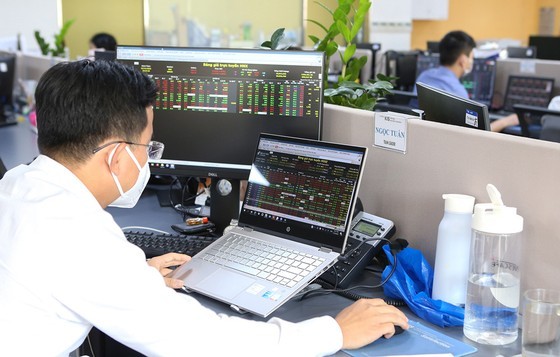 The current stock market context can be an opportunity for investors. (Photo: SGGP)
The current stock market context can be an opportunity for investors. (Photo: SGGP)
The fact that Vietnam's stock market retreated by 30 percent from the peak and the cash flow disappeared in the market was explained as a consequence of the cash flow shifting between investment channels. According to Mr. Dao Minh Chau, Equity Research Deputy Director at SSI Research, individual investors have continuously net withdrawn from the market due to the sharp drop in the stock market. The increase in bank deposit interest rates has also drawn a part of the money from the stock market. In addition, the economy opened up after the Covid-19 pandemic, leading many investors to withdraw their money from securities to return to production and business activities. Foreign investors also net sold VND3.5 trillion in the whole market in September 2022. According to securities companies, the current P/E ratio of the VN-Index is approximately 9.98 times - the third lowest level in history, and the P/B ratio is at 1.71 times - the fifth lowest level in history. This situation was seen to happen rarely, except when the economy was on the verge of a recession or serious crisis. The fact that the P/E and P/B ratios have returned to the current low levels shows that stock valuation is extremely attractive. History shows that when the stock valuation is cheap, it will attract new cash flow, and the market will bounce back afterward. Moreover, the P/E ratio of Vietnam's stock market is much lower than that of other markets, such as Thailand, the Philippines, Malaysia, and Indonesia. So the expectation of attracting foreign capital is higher than in other countries in the region. In fact, in the first two weeks of October 2022, when the market fell steeply, foreign investors returned to be net buyers on Vietnam’s stock market with more than VND1.6 trillion, bringing positive signals to Vietnam's stock market. According to experts, the stock market in the short term still faces many challenges because the factors causing the declines of the global and domestic stock markets are rising inflation, central banks raising interest rates, recession risk, exchange rate, geopolitical conflicts, and handling violations on the domestic bond market. However, experts still think there are many good investment opportunities if investors are interested in long-term prospects and ignore short-term fluctuations. Mr. Le Duc Khanh, Analysis Director of VPS Securities Company, said that in the context of the volatile stock market, investors should follow the school of accumulating stocks and the strategy of buying a small reasonable proportion of high-quality stocks and leading stocks when the prices of these stocks plummet. Mr. Huynh Minh Tuan, the founder of FIDT Joint Stock Company, also said that the current difficult situation of the stock market could be an opportunity for investors because this is a period when the advantage belongs to buyers to choose good stocks.
